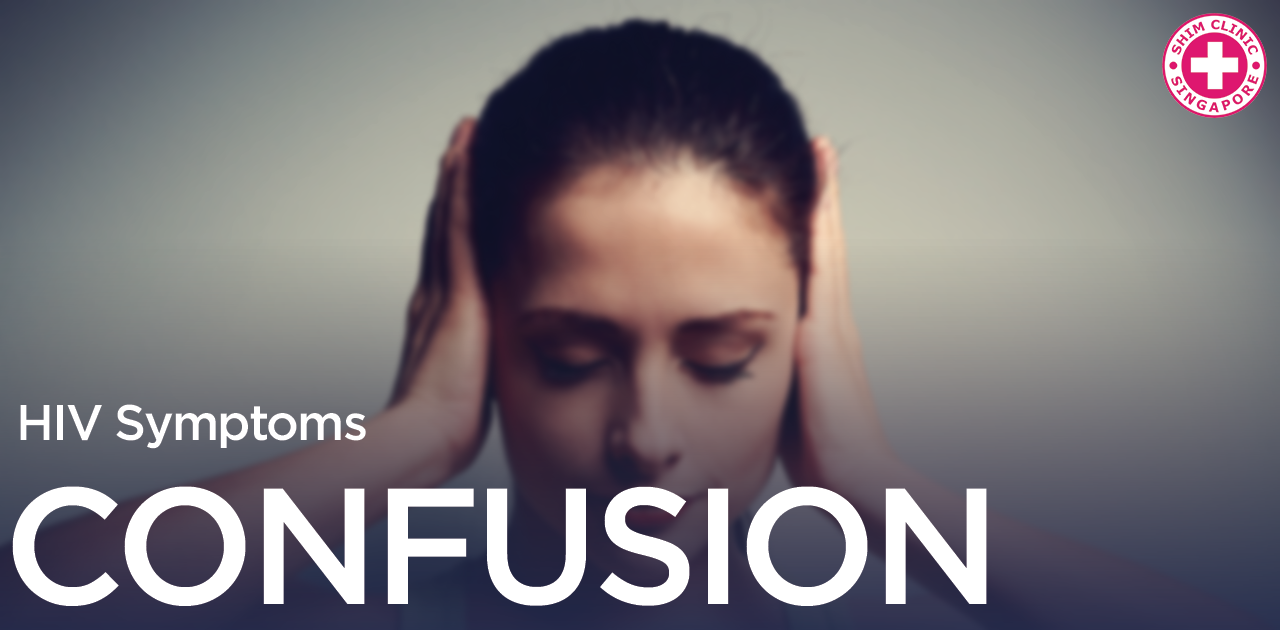HIV Confusion Singapore | Shim Clinic
| Help me about HIV Confusion ! |

| Permalink: https://shimclinic.sg/hiv-confusion |
Although everyone feels confused from time to time, a pronounced change in your mental state can indicate a serious medical condition and should prompt immediate medical attention. It could be a sign of HIV, or another serious or even life-threatening condition.
The early phase of HIV infection, which is known as acute HIV infection, can produce a variety of symptoms in many of those who are infected. There are also some people who don’t notice any symptoms, and don’t know that they’re infected with HIV. However, many others do experience symptoms but don’t realize that these are HIV symptoms, so they also don’t realize that they have HIV. This is a problem, because not knowing early that you have HIV means that you may unknowingly pass the virus on to others, and you will also miss your chance to get treatment early, while the virus is easier to control.
One possible symptom of acute HIV infection is confusion. This type of confusion begins relatively suddenly and is a change from your normal state. You may become confused when you would normally feel comfortable and confident. For example, you may lose your way around your own neighborhood. While everyone does have confusion on occasion, you should take note of this symptom when it’s a pronounced change from your normal mental state.
- During the early phase of HIV infection, you may experience a variety of symptoms, including confusion.
- Confusion can also be a symptom of many serious medical problems, including other infections, a concussion, a stroke or hemorrhage in the brain, or even diabetes or kidney disease.
- The type of confusion that should prompt medical attention is a significant change from your usual mental state. Everyday minor confusion is common, but you should seek medical attention immediately if you’re much more confused than usual, particularly when this is a sudden change.
- Tell your doctor about any HIV exposure you may have had, so you can get the HIV test you need.
Pronounced confusion can be caused by a variety of different diseases that affect the brain. These include serious infections such as meningitis. A concussion caused by an injury can also lead to confusion. A stroke or hemorrhage in the brain is another potential cause. Even generalized diseases like diabetes and kidney disease can lead to confusion if uncontrolled. The list of potential causes of confusion is much longer than this. Anything that significantly impairs the brain’s functioning can cause this symptom.
If you suddenly feel confused, or if others note that you aren’t able to function at your usual level, then it’s very important to get medical attention right away. Some causes of confusion are medical emergencies. If you have had any potential exposures to HIV, make sure that you tell your doctor about them. These could include having unprotected sex with a new partner; having your condom break, leak, or slip while you’re having sex; sharing equipment while injecting drugs; or having a needlestick as a healthcare worker. If you’ve had any potential exposure, then you’ll need an HIV test to determine whether your confusion is due to acute HIV infection. You should also mention any other symptoms that you’re having, because they may be HIV symptoms or symptoms of another disease. The results of your HIV test will be confidential, so you don’t need to worry that the results will become public if you are HIV-positive.
Sources:
Mayo Clinic. “STD symptoms: Common STDs and their symptoms.” Mayo Clinic. Published 18 Mar 2015. Accessed 20 Jul 2016. http://www.mayoclinic.org/std-symptoms/art-20047081
Centers for Disease Control and Prevention. “Screening Recommendations Referenced in Treatment Guidelines and Original Recommendation Sources.” Centers for Disease Control and Prevention. Published 04 Jun 2015. Accessed 20 Jul 2016. http://www.cdc.gov/std/tg2015/screening-recommendations.htm
Centers for Disease Control and Prevention. “HIV/AIDS.” Centers for Disease Control and Prevention. Published 05 Jul 2016. Accessed 27 Jul 2016. http://www.cdc.gov/hiv/
Centers for Disease Control and Prevention. “HIV Basics – Testing.” Centers for Disease Control and Prevention. Published 12 Jul 2016. Accessed 20 Jul 2016. http://www.cdc.gov/hiv/basics/testing.html
U.S. Department of Health & Human Services. “Post-Exposure Prophylaxis (PEP).” AIDS.gov. Published 21 Sep 2015. Accessed 20 Jul 2016. https://www.aids.gov/hiv-aids-basics/prevention/reduce-your-risk/post-exposure-prophylaxis/
| Timeline | HIV | STD | Pregnancy |
|---|---|---|---|
| Before exposure | |||
| Contraception (females only) | |||
| HIV PrEP (pre-exposure prophylaxis) - Stop HIV infection before exposure | STD vaccine: - Hepatitis vaccine - HPV vaccine | ||
| STD / HIV exposure | |||
| 0-72 hours | HIV PEP (post-exposure prophylaxis) - Stop HIV infection after exposure | STD testing * - Screening test - to look for asymptomatic infections - from previous exposures | Emergency contraception with the morning-after pill (females only) |
| 2 weeks | HIV DNA Test | ||
| 1 month | HIV 4th Generation Test - SD Bioline HIV Ag/Ab Combo - Fingerprick blood sampling. - 20 minutes to results | ||
| 3 months | HIV 3rd Generation Test - OraQuick® HIV-1/2 Antibody - Oral fluid or - Fingerprick blood sampling. - 20 minutes to results | STD testing * - Full & comprehensive - diagnostic test - to look for current infections | |
| Watch for | HIV Symptoms | STD Symptoms | |
| If infected | HIV Treatment | STD Treatment | Abortion |
References